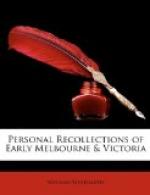I recall with interest and pleasure some early trips into the interior, when it was in a very different condition from now, when the indigenous reigned almost uninvaded throughout, and when aboriginal natives were in many places as plentiful as colonists. For some years squatting life was the predominant or rather all but the sole feature of the interior beyond Melbourne. The little capital was at first always called “the settlement”—a distinctive title, however, which was just expiring when I arrived. But, for some years after, the term “settler” always meant a squatter, and not a farmer, as might be supposed, with his “settled” or fee-simple home.
My first trip to the interior was, towards the end of 1841, to the sheep station of my old friend Sam Jackson, situated on the Deep Creek, seventeen miles northward from Melbourne. There I first tasted damper and saw the novelties of squatting life. Samuel, and his brother William, nicknamed for some reason “The General,” were of the very earliest from “over the straits,” William having been one of the party organized and sent over in August, 1835, by Fawkner. Sam followed soon after, and they “took up” this station on the Deep Creek, under the natural impression that to be so near “the settlement” must be an advantage. They soon found it otherwise for more than one reason. The constant tramp of sheep passing over their “run” to go beyond them exposed their ground to infection, especially from scab. And they were exposed in another way hardly less costly and far more annoying; for every “traveller,” whether bond fide or not, claimed quarters at the Jacksons’, and made the sheep disappear of a hungry morning with marvellous rapidity, and at a time when, with the demand for live stock to fill up the empty country, their value had risen to 40 shillings each and upwards. “The General” had mainly to sustain this attack, as his brother was generally in Melbourne practising professionally as an architect, and was engaged at that very time in building the Scots’ Church in Collins-street. Naturally enough, he would fain have turned somewhat the flank of this invading host; but, without being successful, his efforts only got him the name of “Hungry Jackson.”
Later on, I met further variety of early squatting life in a trip to the Werribee Plains, where some friends, the Pinkertons from Glasgow, and Mr. James Sceales, late merchant and Chief Magistrate of Leith, had their respective stations. On those vast plains, extending westwards 30 to 40 miles, from Melbourne to the Anakies, or Station Peak, the slight and scattered squatting invasion had hardly disturbed anywhere the indigenous features. Thus over a vast solitude we revelled in much of specially Australian scenery, particularly that of tortuous and deeply excavated “creeks,” with their chains of ponds or waterholes, the running stream mostly dried up—indeed sometimes for whole years together—but all characterized, more or less, by irresistible rushes after heavy rains, sweeping all before them, including not seldom the sheep, and even the homestead, of the incautious or inexperienced settler. I have a striking contrast in store when I revisit those plains, which now resound to the traffic of road and railway, and to the busy hum of many towns and villages and of farming and gardening life.




